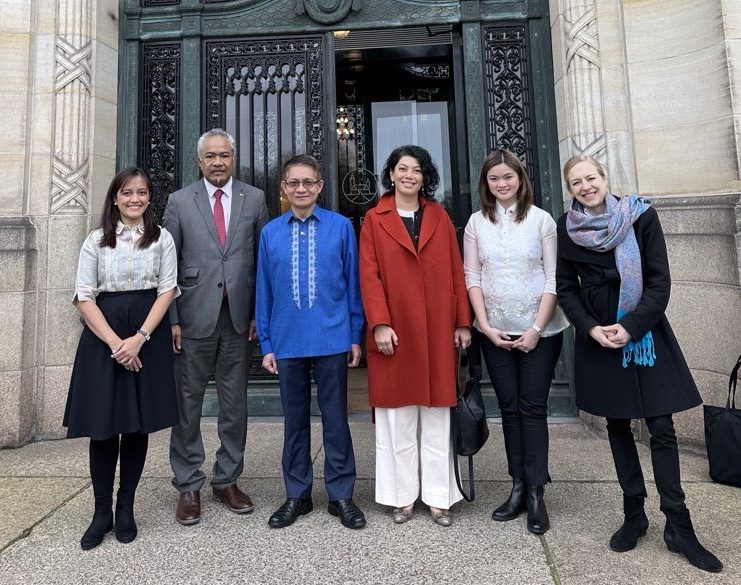SUMMARY
This is AI generated summarization, which may have errors. For context, always refer to the full article.

MANILA, Philippines – The Philippine government stands with the Pacific island nations in their bid to get the world court’s opinion that would provide a legal framework to compel the biggest polluters to pay those suffering from the adverse effects of climate change.
“Philippines proffers that prompt reliefs should be given and made available to affected States and peoples so as to immediately cease or mitigate any environmental damage,” the Philippine government wrote in its 45-page submission, filed by the Office of the Solicitor General to the International Court of Justice (ICJ) in The Hague on Thursday, March 21.
Last week was the deadline of the ICJ, or the United Nations (UN) court also known as the world court, for UN member states to file their submissions, or make their positions known about the current request for an advisory opinion.
Lee-Anne Sackett, the legal manager of the Vanuatu Climate Diplomacy Program, said on Friday, March 22, during a panel at The Hague, that this is “the biggest case in history in terms of participation in the ICJ.”
Vanuatu initiated the resolution, which the UN General Assembly later adopted, to request the ICJ for an advisory opinion. Essentially, the resolution wanted the ICJ to answer these questions:
- What are the obligations of States to protect climate systems?
- What are the legal consequences for States that have caused significant harm to the climate system through their acts or ommissions?
Climate change treaties have been around since at least the 1997 Kyoto protocol, but the years after have been filled with frustration on the lack of meaningful results that came out of it. This led the Intergovernmental Panel on Climate Change (IPCC) to say in 2023 that “there is a rapidly closing window of opportunity to secure a liveable and sustainable future for all.”
The latest high-level negotiations in the Conference of Parties (COP) are focusing on the loss and damage fund, a mechanism by which polluter states must pay up.
“[The loss and damage fund] is still more or less an empty bucket, there’s no recognized obligation on States to pay into that fund,” said Margaretha Wewerinke-Singh, Vanuatu’s counsel to the ICJ, during Friday’s panel at The Hague.
The desperation has led to Vanuatu’s effort, an initiative that was started by the youth group Pacific Islands Students Fighting Climate Change (PISFCC), to bring this case to court.
The hope, foremost, is that ICJ agrees to issue an advisory opinion, which the Philippines supports. But meaningfully, that the ICJ’s opinion supports the stance that States who cause significant harm to climate systems must be held accountable.
Philippines invoked the ‘polluters must pay’ principle, and said “while the principle is not explicitly referred to in the United Nations Framework Convention on Climate Change, the Kyoto Protocol, and the Paris Agreement, many of the provisions and obligations stated therein point to the evidence that said principle is being applied.”
“When a State – by itself or through State actors or other entities whose actions or omissions may be attributable to the State – commits acts or omissions that do not faithfully conform to its international obligations, the same constitute a breach of an obligation and, under international law, is an internationally wrongful act,” said the Philippines team, led by Solicitor General Menardo Guevarra, with inputs from the University of the Philippines (UP) Institute of International Legal Studies.
“[This] marks the welcomed return of the country in the proceedings of the ICJ, the last one having been decades ago,” said Philippine Ambassador to the Netherlands J. Eduardo Malaya, who personally filed the submission at the Hague with OSG solicitors.
Who will block this
Because UN member states are authorized to forward their submissions, advocates are now watching which countries will block this accountability mechanism.
For example during the negotiations to adopt Vanuatu’s resolution to go to the ICJ, United States was among the few countries which expressed that a judicial process was not “the most conducive to supporting diplomatic processes.”
The US is a key Philippine ally. But in this regard, the Philippines disagreed that climate change is a purely a diplomatic issue that one can only resolve through political means.
“Regardless of the political aspects and dimensions of climate change, this Court cannot refuse to admit the legal character of a question and has the duty to discharge an essentially judicial task, which pertains to the determination of the obligations of States as imposed upon them and the consequences of their acts or omissions as sanctioned by international law,” said the Philippines.
Alyn Ware, who was a campaigner during the nuclear weapons advisory opinion process at the ICJ, said that when the ICJ decides to hold an oral hearing, or when the time comes that states can respond to the submission of other states, those who support a legal mechanism must be ready to “cut into the ‘yes-but’ arguments.”
“You have governments who say ‘oh yes we agree, we have to cut emissions, but we can’t do it too fast, it will destroy our economy, we will lose our jobs, there’d be many other excuses,” said Ware.
“We have to demonstrate that green economies are job creators, green economies are good for the economy, they can stimulate economic development,” Ware added.
Outlook
Experts predict that if the ICJ decides an oral hearing, it will be by the end of this year or next year. The best case scenario is the ICJ issuing an advisory opinion that States can be legally held accountable for their acts or omissions that destroy climate system.
The worst case scenario is the ICJ decides it will not issue the opinion at all, or if the opinion merely refers to existing treaties.
“[That] doesn’t add anything, so then you shall have gone through all of this processes to be left with empty hands, that’s really completely useless, [but] that’s quite an extreme scenario,” said Singh.
“[That] would not only be disappointing for the purpose of climate justice, but it would be quite disastrous for international law and institutions because it would undermine the ability of the court…to address a problem of civilizational proportion,” said Singh.
Ware believes that the ICJ’s decision would not be that extreme, saying that “the court could only be going from moderate to fantastic, how close we get to the fantastic is what we’re looking at.”
ICJ’s advisory opinions have been criticized before as not having significantly changed things. That’s generally the main criticism of international law – when its orders are not enforced by countries who claim sovereignty, or just by countries who are powerful enough to ignore orders, and opinions.
The Philippines said “nevertheless, the issuance of an advisory opinion is not without ‘moral consequences which are inherent in the dignity of the organ delivering the opinion, or even of its legal consequences’.”
Ware advised stakeholders to, as early as now, assume the best case scenario and “think about how are we going to implement the decision that will come out.”
The Philippines proposed a version of the Writ of Kalikasan. The writ, which was a unique innovation for Philippine law and a first of its kind in the world, is a legal instrument that compels actors to fulfill a duty for the environment. Locally, it can also come in the form of protection orders that could stop projects that are seen to destroy environment.

Victims of climate change
The case is a storybook narrative of bringing people – the victims – to the court, as states and other groups can submit testimonies from those whose lives have been impacted by the adverse effects of climate change.
The Philippines told the court it had incurred P497.45 billion in damages from 2012 to 2022 “due to natural extreme events and major disasters.”
In the island nations, “communities that had to relocate because of sea level rise [had] tendencies that they will lose their identity because in the Pacific, we are connected to our environment, to our land,” said Ilan Kiloe, the political and legal adviser of the Melanesian Spearhead Group.
Sackett said getting testimonies from Vanuatu communities have been a challenge because of logistics and connectivity.
Currently, there are requests for advisory opinions from other bodies, namely the Inter-American Court of Human Rights and the International Tribunal for the Law of the Sea (ITLOS), expected to touch on the human rights component and the marine environment aspect of climate change.
The hope is to get good opinions from the two bodies, to lay the ground for the ICJ.
“If the advisory opinion comes out to be positive, it will assist the COP negotiations moving forward,” said Kiloe.
“The road will still be longer…I’m sure there are going to be testing moments, but it’s really worthwhile,” said Cristelle Pratt, assistant secretary general of the Organisation of African, Caribbean and Pacific States (OACPS). – Rappler.com
Add a comment
How does this make you feel?














There are no comments yet. Add your comment to start the conversation.